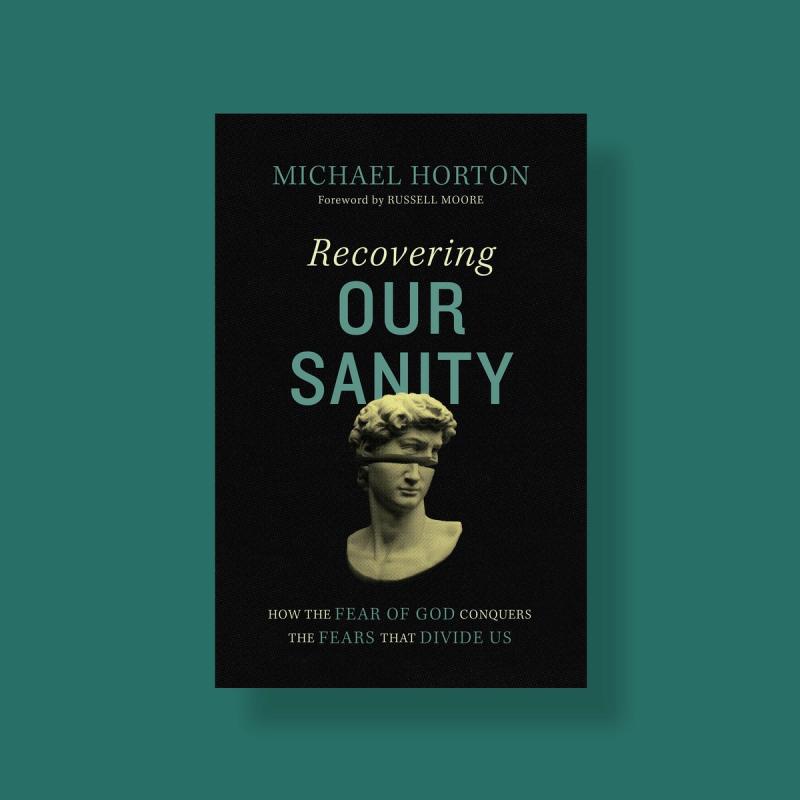There is no more timely issue for a theologian to address than “fear,” surrounded as it is by the frantic and hyperbolic rhetoric of our culture. Some are living their lives in fear of COVID-19, we are told, while others are living their lives in fear of revisionist history within our education system. It is easy to dismiss those who disagree as simply living in fear.
But we do live in fear. All of us. We fear the loss of our financial security, or the culture as we know it, or for our kids’ future, or the exposure of our sin. Fear is not a mere rhetorical devise, but a universal reality. Michael Horton, in Recovering Our Sanity: How the Fear of God Conquers the Fears that Divide Us, walks us from the ledge of hyperbole back to the heart. What do I fear and how does this relate to the fear of God?
This personal intrusion upon the reader’s heart is what makes this book immediately stand out. Horton is not here to inveigh against the culture or provide fodder for Twitter pundits. He has never been a fan of Christians losing their identity to win the culture wars. Rather, he trades the sledgehammer for the scalpel, inflicting necessary wounds upon hardened Christian hearts so that they be properly bound.
In this book, Horton first grounds the reader in the biblical notion of the fear of God before surveying the controversies of the day with a deft touch. What is it about the Lord that deserves our reverence and awe? What is it about the lion that makes us approach him, all the while knowing that he can undo us with but a word? Thus, rather than a call to action, we are first called to ponder: Do I fear the Lord?
As a result, neither our quest for escape nor indignation are indulged. We must first ponder the glory of God and let our words be few. Step-by-step, Horton then leads us to consider the effects of biblical fear upon the heart of the ransomed sinner. This is not mere navel-gazing. Rather, it is a refreshing shift from cultural consternation to conviction of sin. Before I pray for all the poor heathen in the other cultural tribe, how fares my own soul before the living God?
Gradually, Horton shifts the focus from the fear of God to how such a fear affects our view of death, vocation, Christian America, sexuality, and race. I must confess, the intellectual voyeur in me wanted to skip ahead to those latter two issues. This is what we all care about nowadays, right? Something tells me that the author knew what he was doing by making those subjects the tail end of his book. Even as he teaches patience to the reader, he is modeling it by having us plumb the depths of Scripture and our own hearts before we go further.
There is a brazen quality to Horton’s writing that might make this book his punchiest yet (though with a light touch). From the outset, he touches on issues like global warming and doesn’t stop until the conclusion of the book. His perspectives on both politics and history, though nuanced, will invite debate. Yet that seems to be one of the purposes of this book. Let’s humbly reevaluate why we believe what we believe before the God of glory so that we can be more generous in our discussions with others.
Horton’s chapter on “Christian America” may be a bit overstated. Over the last 20 years, he has offered trenchant critiques of the culture wars mindset but it seems to me that the terms of the culture war are shifting. While there is a sizable minority who wish to preserve a culturally conservative America, there is a less evangelical hue than we witnessed a few decades ago. Immigration has supplanted abortion; educational indoctrination has supplanted the institution of marriage. Don’t let the crosses alongside the gallows in front of the Capitol fool you, evangelicalism (whatever that word still means) is becoming more diluted and weakened in the GOP by the day.
In fact, while the final two chapters on sexuality and race are certainly worth waiting for, Horton could’ve focused on the fears at home. Frankly, as conditioned as they are by the culture, I don’t think Christians care that much about sexuality as a cultural or political issue. Rather, they are worried about the force-feeding of a sexuality-centered spirituality upon their children. They are not concerned as much about those who are same-sex attracted as they are that there kids are being encouraged to embrace and experiment with alternative sexualities. Thankfully, the theological framework that Horton sets forth in preceding chapters helps draw these concerns back to the proper fear of the Lord as well.
One final, highly subjective critique: The conclusion is far too short. When this book rightly earns another printing several years from now, I, for one, will hope for more at the end. Horton has pithy phrases throughout—why not save some of them for the end? Perhaps he could engage in a bit of futurism about what a healthy fear of God might look like for the next generation?
All in all, Horton has given us a book that stands apart from its peers. It is neither a systematic theology—Horton’s wheelhouse—or a cultural jeremiad—Horton’s bane. It reorients fear around the throne of God, traces it through the human heart, and finally engages a culture that is subsequently defanged. This book will certainly earn its critics, but if they read it as well, then we all win. May we all take a breath amidst the present cultural confusion and ponder anew that wisdom begins with the fear of God.
Stephen Roberts is a US Army chaplain and has written for The Washington Times and The Federalist.



